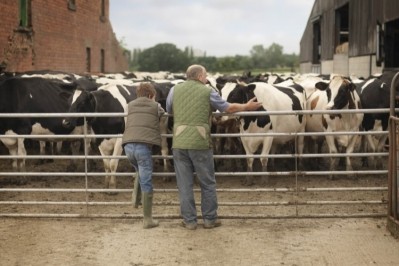‘We need to look after our farmers’: Arla Foods UK’s Ash Amirahmadi vows to ‘fight very, very hard’ to shield farmers from farmgate price shocks

In a hotly-anticipated panel discussion that also featured Müller Milk and Ingredients MD Rob Hutchison and First Milk CEO Shelagh Hancock, Amirahmadi addressed a question whether the market could provide profit margins that would encourage dairy farmers to stay on as food producers.
Arla Foods UK’s MD said: “If we look at the data, we’ve seen on-farm costs increase by over 80% in the last 18 months. Of course, we’ve also seen farmgate prices go up, but what everyone would be concerned about is what’s happening to the markets and what would happen going forward.
“I’ve got two or three key messages around this. We need to look after our farmers - and I am talking economics now - because probably what’s going to happen, and this isn’t me talking the markets down, but what’s probably going to happen is we are going to enter a period when farmgate prices would start to go below the cost of production. And if we don’t want to see a situation that we had a year ago or so, where supplying products onto shelves was being impacted, we need to be really careful about that.
“The second thing is, our farmers are making the green transition. Not only do they need to cover their costs, but they are also making investments on farm. Will that mean that we are not going to see the cycles of farmgate pricing? No, I think we are still going to see that because we don’t live in a world where one can control the market in that way.
“But as the MD of the largest dairy company in the UK, I would fight very, very hard to make sure that dynamic does not go the wrong way.” - Ash Amirahmadi, Arla Foods UK
Addressing the room on the main threats and opportunities for UK dairy, Müller's Hutchison highlighted that building resilience would be key to tackling future challenges. “When we look at what we’ve dealt with in the last few years - whether it’s been the pandemic, labour shortages or inflation - I think these [issues] are going to continue and be challenging in different ways. Couple that with the dairy market volatility that we are seeing, [and] I’d say that maintaining resilience and being able to adapt to changing environment around you would be key to how you run your business.”
Speaking of Müller’s efforts on that front, he added: “We’ve put a lot of effort to rebuild the relationships with our farmer pool but also to build common understanding and if we can get closer to our farmers and our customers and retailers then it’s a much stronger supply chain overall.”
First Milk’s Hancock chimed in: “I agree [that the main threats are] the volatility and uncertainty in marketplaces. The last few years have been filled with major external events that have been completely out of our control that we’ve had to deal with just about everything. So it’s been about building resilience. I think it’s about focussing on things that are within your control and not building on your strengths and working on those weaknesses that you have exposure to those volatilities.”
NFU Dairy Board chair Michael Oakes, who was also on the panel, added: “We have massive support from consumers. Our biggest threat is to lose that connection to consumer, that support. The key opportunity is to keep working together. Build on what we’ve built on already.”
Export, welfare labeling, and bovine TB
Other topics discussed by the panelists included trade, where First Milk’s Hancock admitted that exporting to the EU had become more burdensome, and that long-term investment and relationship-building was needed to achieve good results over time. “Around 20% of our cheese production goes to export and that’s been developed in the last five years. But the important thing is why do you [export]. You can’t build a business based on what particular return market is on any particular day; supply chains need to be developed, relationships built.
“If you open your front door, you definitely need to look at your back door and ensure imports coming in are being controlled.” – Shelagh Hancock, First Milk
“A lot of countries we trade with don’t have free trade agreements so we could do with more help there,” she said adding that ‘the bureaucracy is huge there in terms of dealing with exports to the EU’.
NFU’s Oakes highlighted that the industry needs to be careful about the potential mandatory implementation of a bovine TB jab in the UK. “What we don’t want to do is stop trade because of vaccination. I’ve been told the vaccine is three years away from actually being used on any kind of scale and we need to make sure that we don’t shoot ourselves in the foot because we can’t export from our livestock industry. We are very much involved in this debate.”
Meanwhile, Verity Richards, NFU’s dairy policy specialist on the panel, spoke of the Union’s opposition to welfare labeling in dairy. “We’ve said from the start that we don’t support labelling by-production - it’s not an accurate measure of welfare. We’ve also in the UK got so many different schemes by the processors and also Red Tractor, which is the most comprehensive labels across Europe, and is covering over 98% of the dairy industry.
“And then there’s the question of who’s going to pay for it – we are looking at the data of AHDB and Kantar, and consumers are looking to buy cheaper products right now. So adding another label would potentially complicate things.
She concluded: “What ‘welfare’ means to different consumers is debatable and would they be willing to pay for it? And if they are not, who is going to – it is likely to be the industry and farmers who would have to adjust their systems. So we’ve been clear that we would not support even the idea of a consultation.”








